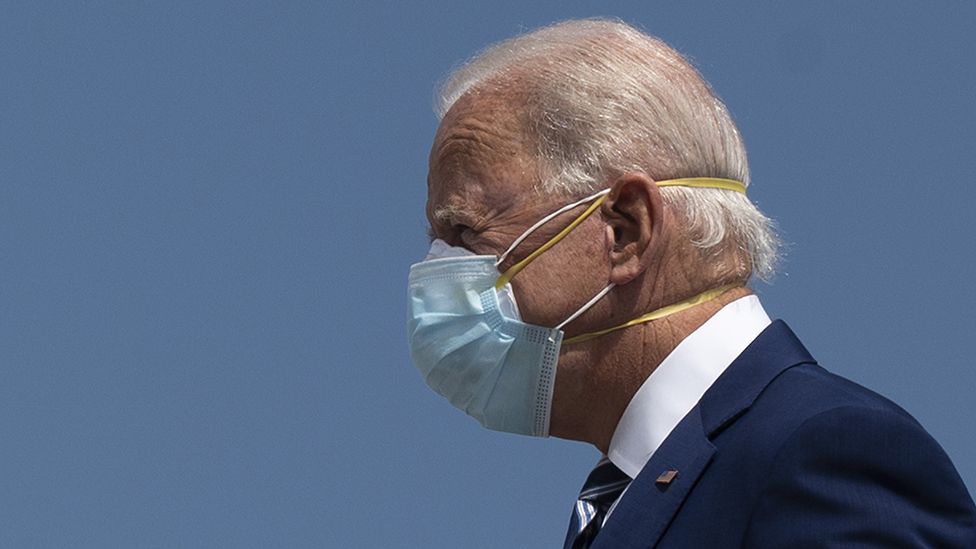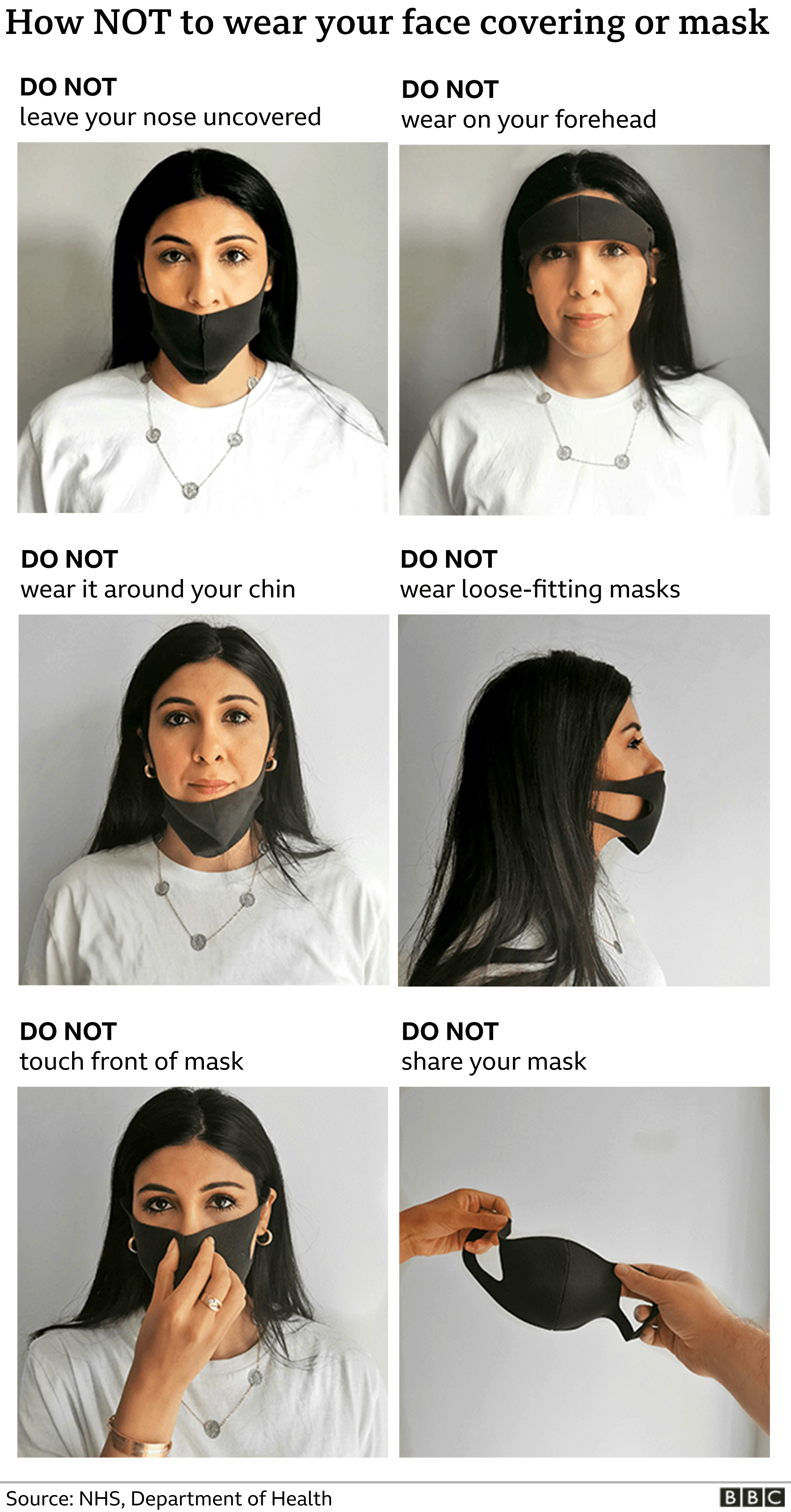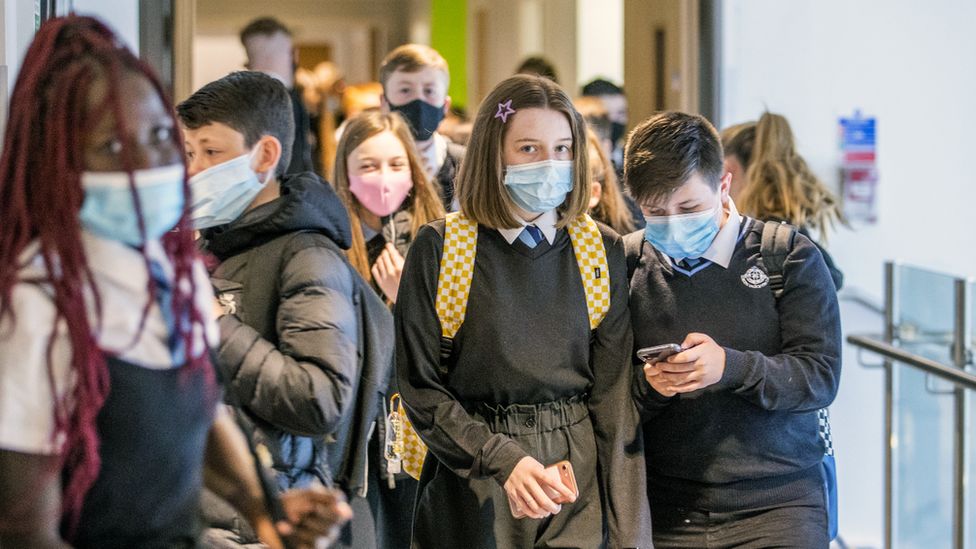Wearing a cloth mask over a disposable surgical one might give better protection, say US health officials.

image copyrightGetty Images
New research from the US suggests wearing two masks at the same time could give better protection against coronavirus and prevent air leaks.
Face coverings reduce the spread of coronavirus droplets from coughs, sneezes and speaking, but they must be a good fit.
With new, more contagious variants of the virus circulating, the US Centers for Disease Control (CDC) says people may have a better fit and more protection if they wear two masks at the same time.
Other tips for the wearer include:
- Choose a mask or face covering with a nose wire
- Check it fits snugly over the mouth, nose and chin
- Make sure it has at least a couple of layers
- Tie a knot in the ear loops of surgical masks to make a better fit
The highest level of protection is provided by FFP3 (or similar) masks worn by healthcare workers in high risk settings to safely do their job.
In some countries, such as Germany and Austria, medical-grade masks (such as disposable surgical ones) are compulsory on public transport and in shops.
These are made from non-woven fabric, which is better at stopping spray and droplets.
Cloth face coverings do not give the wearer as much protection.
But the World Health Organization says it has no plans to change its guidance recommending fabric face masks for the general public.
The main purpose of face coverings is to protect other people from coronavirus, rather than yourself. If everyone wears one, the risk for all goes down.
When worn correctly, they should cover the nose and mouth – the main confirmed sources of transmission.
They can help to reduce the spread of the virus from people who are contagious, including those who have no symptoms.
There is also evidence they can offer some protection to the wearer, although they are not a replacement for social distancing and hand-washing.
Face coverings (or masks) are now compulsory across the UK on public transport and in most indoor public spaces.
The exact rules can be seen here for:
People can be refused travel for not following the rules, or fined. In England and Northern Ireland the police can issue a £200 fine. In Scotland and Wales, a £60 fine can be imposed. Repeat offenders face bigger fines.


Some people do not have to wear a face covering. They include:
- Children (under 11 in England or Wales, under 13 in Northern Ireland, under five in Scotland)
- Those unable to put on or wear a face covering because of a physical or mental illness or disability
- People for whom wearing or removing a face covering will cause severe distress
- Anyone assisting someone who relies on lip reading to communicate
You can remove your mask if:
- You need to eat, drink, or take medication
- A police officer or other official asks you to, or for shop staff to verify your age
- You are entering a shop to avoid harm, if you do not have a mask on you
Young children should not wear face masks because of the risk of choking and suffocation.
Government guidance says you do not have to show any written evidence for why you are exempt.
There are no official exemption cards or badges, although the government provides some suggested templates which people can use if they wish.
There is more specific guidance about face coverings and exemptions in Northern Ireland, Wales and Scotland.

image copyrightPA Media
Primary and secondary schools in the UK have moved to remote learning for most pupils.
The government does not recommend wearing face coverings in classrooms because of measures already in place.
However, each nation has different rules:
- In England, secondary schools can require face coverings in communal areas, where social distancing is not possible and they can be mandatory if local restrictions require them
- The Scottish government says all secondary school pupils should wear face coverings in corridors and communal areas, and senior pupils (years S4-S6) and their teachers must wear them in class
- All staff in Scottish schools must wear masks where social distancing is not possible
- In Wales, face coverings are recommended in high schools when social distancing is “unlikely to be maintained”
- In Northern Ireland, face coverings must be worn in the corridors of post-primary schools
The BBC has created a guide on how to make your own face covering.
The government has issued its own advice too.

